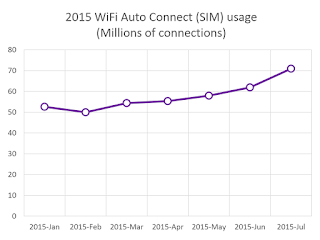Powered by Radiator: Verkkovieras.fi
This blog post is first one of the
Powered by Radiator articles, where we and our agents or partners introduce products, services or solutions they have made using Radiator. If you have a product, service or solution you would like to introduce, please contact sales (a.t.) radiatorsoftware.com for more information.
This time it's
Arch Red's turn to introduce their cloud based authentication service --
verkkovieras.fi ,
Powered by Radiator.
verkkovieras.fi for simple and secure federated Wi-Fi authentication
Verkkovieras is a Finnish word, which means network guest.
Verkkovieras.fi is
Arch Red's cloud authentication service for organisation’s employee and guest network access control. The service also supports authentication roaming federations such as eduroam and roam.fi making the service an easy way to deploy and serve federated network access for employees, guests and partners.
We know that maintaining user databases and RADIUS servers for employee and guest access can be difficult, especially when there’s additional complexity such as federated roaming. With verkkovieras.fi we focused in building a service, which is easy to deploy and easy to use. We thought, designed, thought some more and improved our design to be as clean and clear as possible.
Easily deployed in any Wi-Fi network
To deploy verkkovieras.fi authenticaton service you only need RADIUS capable authenticated devices such as for example almost all Wi-Fi controllers and access points. The authenticating device, usually the Wi-Fi controller, needs to be able to communicate with our cloud based servers in Internet and that’s it -- only our server details and Wi-Fi networks need to be configured in the controller.
User account registration as easy as email
Employees manage their user accounts themselves by requesting them from WWW page and after simple email-www page confirmation they activate their email address based user account. Account’s username is their email address and password is randomly generated string. We wanted to make sure that the network password is secure and on the other hand create a separate user account for network access. This was to keep more important or sensitive passwords such as Active Directory or other service passwords separate and safe. This way the employee cannot undermine the security by changing password to less secure or more sensitive one.
Federated roaming with a flick of a switch
Roaming federations and federated user access is even simpler, just select which federations and to activate or deactivate it. Your employees or visiting roaming guests are then able to roam free within federations and networks with same profiles they use for network access in your home network.
Easy guest user access or traditional vouchers -- you choose
For guest user access there are two options, a simple time-limited guest user account for automated access and possibility to create and print more traditional time-limited guest user accounts before hand. Automated access means that the user account can be integrated for example with WWW page based authentication to provide guest short Internet access with just a click of a button on the authentication page. The traditional guest user accounts can be used like vouchers, the username and password must be entered on the authentication page or system dialog to get the access to network.
All this as a cloud service, ready to be deployed today
 |
| verkkovieras.fi architecture |
We packaged all this in a redundant Amazon cloud based service distributed across two geographical regions, where we handle the difficult details such as scaling, server certificates, EAP methods (EAP-PEAP, EAP-TTLS, EAP-PWD) leaving you as a customer time to focus to your business and core functions.
If you are interested, contact our sales team: sales (a.t.) archred.com for more details.
















